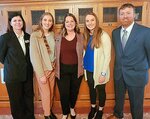BROOKINGS — The career possibilities for athletic trainers in South Dakota are expanding thanks to the efforts of a South Dakota State University clinical assistant professor.
Educating …
This item is available in full to subscribers.
To continue reading, you will need to either log in to your subscriber account, below, or purchase a new subscription.
Please log in to continue |



BROOKINGS — The career possibilities for athletic trainers in South Dakota are expanding thanks to the efforts of a South Dakota State University clinical assistant professor.
Educating future athletic trainers in the SDSU School of Health and Consumer Sciences and serving as the president of the South Dakota Athletic Trainers’ Association, Mary Beth Zwart has made an impact on the profession and on her students.
During the 99th legislative session, Zwart advocated for reforms t o modernize South Dakota’s a t h l e t ic training statute and u p d a t e licensure revocation to m a t c h professional opportunities. The efforts resulted in Senate Bill 151, an act to “revise and repeal provisions related to the licensure of athletic trainers.”
According to Zwart, the bill repealed around 12 sections of state law in the state and updated the language to today’s athletic training practice.
“The previous law really wasn’t in totality what athletic trainers are educated to do today,” Zwart said. “We really work with the prevention and management of acute and chronic injuries and illnesses. Really the new definition essentially just modernized that language.”
In part, the law viewed athletic trainers in the collegiate setting with references to the patient population as athletes and other team verbiage. In today’s practice, athletic trainers have a larger patient population including athletic teams at various levels, other healthcare settings, community organizations and in industry.
State Sen. Ryan Maher and Rep. Greg Jamison introduced SB 151. The legislation passed through the Health and Human Service Committees and the floor of both the House and Senate unanimously.
During the House Health and Human Services Committee meeting on Feb. 27, Zwart provided testimony on the topic.
“In 1984, Ronald Reagan was president, LeBron James was born, Mary Lou Retton won gold at the summer Olympics and Sherwood Berg was president of South Dakota State University,” Zwart told the committee. “Forty years later, in 2024, healthcare is practiced very differently.”
She described how the role of athletic trainers is now recognized as an allied health profession with certified trainers specializing in “prevention, diagnosis and intervention in emergent, acute and chronic medical conditions involving impairment, functional limitations and disabilities.”
Additionally, Zwart discussed how athletic training can expand beyond athletics and into the performing arts, public safety, occupational health and the armed forces.
“I know that a lot of work and effort went into bringing this legislation, and I’m happy to support it,” Rep. Mellissa Heermann said.
During the committee meeting, Zwart was asked if this legislation would give athletic trainers in South Dakota the opportunity to open their own business.
Zwart said it will now be a possibility in the state as 1.6% of members of the National Athletic Trainers’ Association are independent contractors. Likely, this will allow more athletic trainers to provide services in their communities outside of athletic team activities. The legislation received Gov. Kristi Noem’s signature of approval on March 26 and will become law on July 1.
Now on its fifth year, the SDATA hosted a legislative advocacy day called “Hit the Hill” on Jan. 25. The event is preceded by a Student Leadership Conference. Both days provided an opportunity for students to network with working athletic trainers and learn about the legislative process.
“It was a little bit of a learning curve to try and make it understandable for everyone involved,” Faith Weiland, a Master of science student in athletic training, said about advocating to legislators.
The association pairs students in the athletic training program with a working athletic trainer as they meet with legislators to share information about the profession.
Zwart said t his shows f uture athlet ic t ra i ners the proc ess a nd prepar es them to be advocates of the profession anywhere they go as 49 states in the U.S. reg u late the practice of athletic training.
“I t h in k the biggest piece is that our students see t he value of advocating,” Zwart said. “Nobody else is goi ng to advocate for you, your profession or for an organ i zation.”
Weiland said her professor was keeping her and her classmates aware of t he legi slation thr oug hout the process a nd prepared them to t alk to legislators directly about t he topic. She also took away a further understanding of self-advocacy.
“I t hink it can open a lot mor e doors (for athlet ic t raining) and t hat’s really excit i ng for me,” Wei land said. “To be able to see the athletic training profession take of f… and t he inc rease in job opport unities in Sout h Dakota is exciting a s w ell .”
Zwart hopes this is a learni ng exp erience outside of the classroom that st udents will be able to take into t heir future careers.
“We didn’t go to school to change legislat ion,” Zwart said. “It helps them to see how t he legislation does impact what they do as a n athlet ic trainer on a day-to-day basis.”